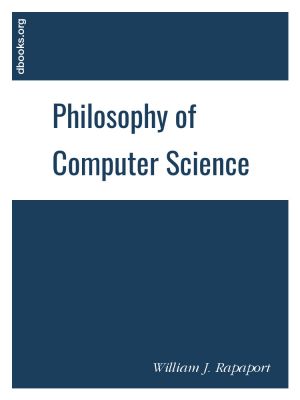Philosophy of Computer Science
An Introductory Course
by William J. Rapaport
DescriptionTable of ContentsDetailsHashtagsReport an issue
This book is intended for readers who might know some philosophy but no computer science, readers who might know some computer science but no philosophy, and readers who know little or nothing about both! So, although most of the book will be concerned with what computer science is, we will begin by asking: What is philosophy? And, in particular: What is "the philosophy of X?" (where X = things like: science, psychology, history, etc., and, of course, computer science). 






Book Description
This book looks at some of the central issues in the philosophy of computer science. It is not designed to answer all (or even any) of the philosophical questions that can be raised about the nature of computing, computers, and computer science. Rather, it is designed to "bring you up to speed" on a conversation about these issues - to give you some background knowledge - so that you can read the literature for yourself and perhaps become part of the conversation by contributing your own views.This book is intended for readers who might know some philosophy but no computer science, readers who might know some computer science but no philosophy, and readers who know little or nothing about both! So, although most of the book will be concerned with what computer science is, we will begin by asking: What is philosophy? And, in particular: What is "the philosophy of X?" (where X = things like: science, psychology, history, etc., and, of course, computer science).
This open book is licensed under a Creative Commons License (CC BY). You can download Philosophy of Computer Science ebook for free in PDF format (29.3 MB).
Table of Contents
Part I
Philosophy and Computer Science
Chapter 1
What Is Philosophy of Computer Science?
Chapter 2
What Is Philosophy?
Part II
Computer Science, Computation, and Computers
Chapter 3
What Is Computer Science?
Chapter 4
What Is Science?
Chapter 5
What Is Engineering?
Chapter 6
What Is a Computer? A Historical Perspective
Chapter 7
What Is an Algorithm?
Chapter 8
Turing's Analysis of Computation
Chapter 9
What Is a Computer? A Philosophical Perspective
Part III
The Church-Turing Computability Thesis
Chapter 10
What Is a Procedure?
Chapter 11
What Is Hypercomputation?
Part IV
What Is a Computer Program?
Chapter 12
Algorithms, Programs, Software, and Hardware
Chapert 13
Copyright vs. Patent
Chapter 14
What Is Implementation?
Chapter 15
Are Programs Theories?
Chapter 16
Can Computer Programs Be Verified?
Chapter 17
How Do Programs Relate to the World?
Part V
Computer Ethics and Artificial Intelligence
Chapter 18
Computer Ethics I: Decisions
Chapter 19
Philosophy of AI
Chapter 20
Computer Ethics II: AI
Part VI
Closing Remarks
Chapter 21
Summary
Part VII
Appendices
Appendix A
Position-Paper Assignments
Appendix B
Term Paper
Appendix C
Final Exam
Appendix D
Instructor's Manual
Book Details
Title
Philosophy of Computer Science
Subject
Computer Science
Publisher
Self-publishing
Published
2020
Pages
938
Edition
1
Language
English
PDF Size
29.3 MB
License

Related Books

This volume discusses the prospects and evolution of informatics (or computer science), which has become the operating system of our world, and is today seen as the science of the information society. Its artifacts change the world and its methods have an impact on how we think about and perceive the world. Classical computer science is built on th...
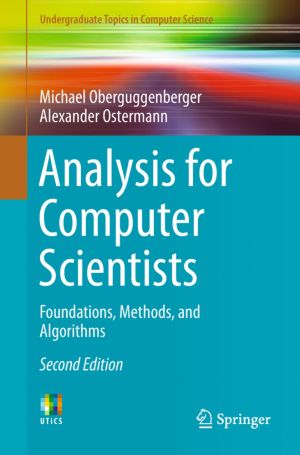
This easy-to-follow textbook/reference presents a concise introduction to mathematical analysis from an algorithmic point of view, with a particular focus on applications of analysis and aspects of mathematical modelling. The text describes the mathematical theory alongside the basic concepts and methods of numerical analysis, enriched by computer ...
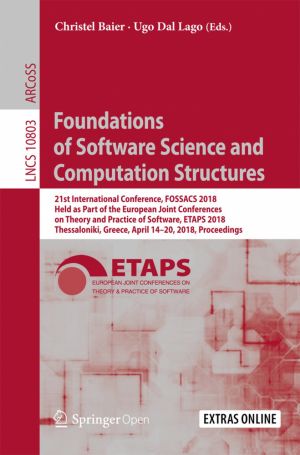
This book constitutes the proceedings of the 21st International Conference on Foundations of Software Science and Computational Structures, FOSSACS 2018, which took place in Thessaloniki, Greece, in April 2018, held as part of the European Joint Conference on Theory and Practice of Software, ETAPS 2018.The 31 papers presented in this volume were ca...

PreliminaryThis book answers two central questions: firstly, is it at all possible to verify electronic equipment procured from untrusted vendors? Secondly, can I build trust into my products in such a way that I support verification by untrusting customers? In separate chapters the book takes readers through the state of the art in fields of comp...
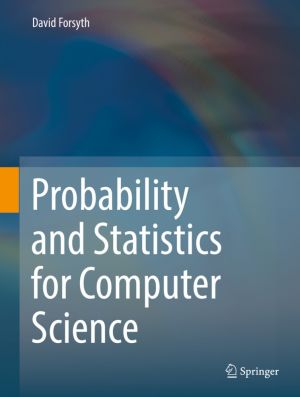
This book is aimed at computer science undergraduates late in sophomore or early in junior year, supplying a comprehensive background in qualitative and quantitative data analysis, probability, random variables, and statistical methods, including machine learning.With careful treatment of topics that fill the curricular needs for the course, Probab...
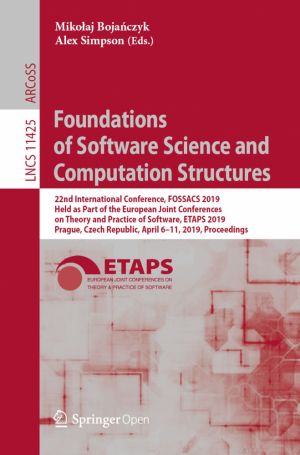
This book constitutes the proceedings of the 15th International Conference on Foundations of Software Science and Computational Structures, FOSSACS 2012, held as part of the joint European Conference on Theory and Practice of Software, ETAPS 2012, which took place in Tallinn, Estonia, in March/April 2012.
The 29 papers presented in this book toget...

